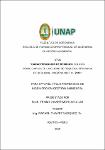| dc.contributor.advisor | Chávez Vásquez, Rafael | |
| dc.contributor.author | Mori Aguilar, Temmy Xavier | |
| dc.date.accessioned | 2019-02-18T03:33:37Z | |
| dc.date.available | 2019-02-18T03:33:37Z | |
| dc.date.issued | 2018 | |
| dc.identifier.uri | http://repositorio.unapiquitos.edu.pe/handle/20.500.12737/5801 | |
| dc.description.abstract | El presente trabajo se desarrolló en la ciudad de Requena, región Loreto,
ubicada a la margen derecha del rio Ucayali, el objetivo fue realizar un estudio
de caracterización de residuos sólidos domiciliarios generados en esta ciudad, el
diseño fue no experimental y la investigación aplicada fue cuantitativa,
cualitativa, descriptiva y analítica. La población en estudio fueron 500 viviendas
que pagan sus arbitrios municipales y la muestra estuvo conformada por 62
viviendas. Para el procedimiento estadístico se empleó la hoja de cálculo Excel y
el uso de la estadística descriptiva, llegándose a los siguientes resultados: El
82,10% de los residuos sólidos generados está conformado por residuos
orgánicos (restos de comida, restos de frutar, cascaras, etc.); el 6,80% está
conformado por los residuos plásticos (como botellas plásticas, bolsas, etc.), y el
5,80% lo conforman los residuos peligrosos (como pilas, latas de aerosoles,
latas de insecticidas, etc.); el 50% utilizan baldes plásticos como depósitos de
residuos; el 32% reutiliza su basura y el 58.1% no entiende el concepto de
reutilización; la Generación Per-cápita es de 0,59 kg/habitante; 14,93 ton/día;
448,04 ton/mes y 5 376,48 ton/año. Se acepta la hipótesis planteada, porque los
pobladores de la ciudad de Requena generan residuos sólidos de origen
domiciliario y estos no están siendo dispuestos de forma adecuada en el actual
botadero generando efectos negativos en el ambiente y salud de las personas,
estos resultados obtenidos nos brindan información del tipo y cantidad de
residuos generados en cada vivienda y esto es necesario para la
implementación de un plan de manejo comunal de estos residuos sólidos
domiciliarios. | es_PE |
| dc.description.abstract | The present work was developed in the city of Requena, region Loreto, located to
the right riverbank of the river Ucayali, the objective was to carry out a study of
characterization of domiciliary solid residuals generated in this city, the design
was not experimental and the applied investigation was quantitative, qualitative,
descriptive and analytic. The population in study 500 housings that you/they pay
their municipal wills was and the sample was conformed by 62 housings. For the
statistical procedure the calculation leaf was used Excel and the use of the
descriptive statistic, being arrived to the following results: 82,10% of the
generated solid residuals is conformed by organic residuals (remains of food,
frutar remains, you cracked, etc.); 6,80% is conformed by the plastic residuals (as
plastic bottles, bags, etc.), and 5,80% conforms it the dangerous residuals (as
piles, cans of aerosols, cans of insecticides, etc.); 50% uses plastic pails as
deposits of residuals; 32% reutiliza their garbage and 58.1% don't understand the
reutilización concept; the Generation Per-cápita it is of 0,59 kg/habitante; 14,93
ton/día; 448,04 ton/mes and 5 376,48 ton/año. the outlined hypothesis is
accepted, because the residents of the city of Requena generate solid residuals
of domiciliary origin and these they are not being willing of appropriate form in the
current botadero generating negative effects in the atmosphere and people's
health, these obtained results offer us information of the type and quantity of
residuals generated in each housing and this is necessary for the implementation
of a plan of communal handling of these domiciliary solid residuals. | en_US |
| dc.description.uri | Tesis | es_PE |
| dc.format | application/pdf | es_PE |
| dc.language.iso | spa | es_PE |
| dc.publisher | Universidad Nacional de la Amazonía Peruana | es_PE |
| dc.rights | info:eu-repo/semantics/openAccess | es_PE |
| dc.rights | Attribution 3.0 United States | * |
| dc.rights.uri | http://creativecommons.org/licenses/by/3.0/us/ | * |
| dc.source | Universidad Nacional de la Amazonía Peruana | es_PE |
| dc.source | Repositorio institucional - UNAP | es_PE |
| dc.subject | Residuos sólidos | es_PE |
| dc.subject | Residuos domésticos | es_PE |
| dc.subject | Propiedades | es_PE |
| dc.title | Caracterización de residuos sólidos domiciliarios en la Ciudad de Requena, Provincia de Requena - Región Loreto - 2018 | es_PE |
| dc.type | info:eu-repo/semantics/bachelorThesis | es_PE |
| thesis.degree.discipline | Ingeniería en Gestión Ambiental | es_PE |
| thesis.degree.grantor | Universidad Nacional de la Amazonía Peruana. Facultad de Agronomía | es_PE |
| thesis.degree.level | Título Profesional | es_PE |
| thesis.degree.name | Ingeniero en Gestión Ambiental | es_PE |
| thesis.degree.program | Regular | es_PE |
| dc.subject.ocde | http://purl.org/pe-repo/ocde/ford#2.07.01 | es_PE |


